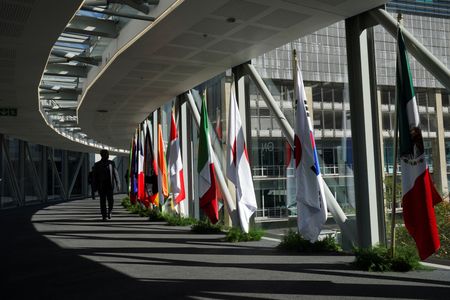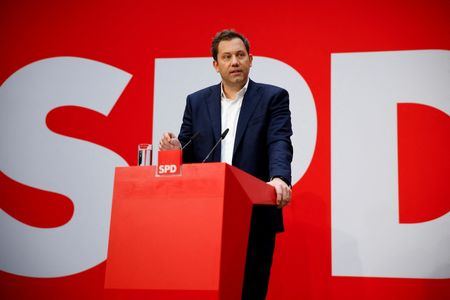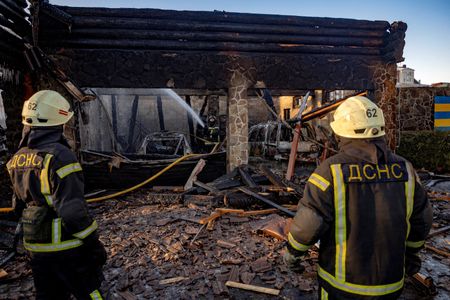By Kopano Gumbi and Andy Bruce
CAPE TOWN (Reuters) – South Africa sought to salvage international talks on tackling global poverty on Wednesday as finance chiefs of several leading economies skipped a gathering of Group of 20 nations in Cape Town held against a backdrop of foreign aid cuts.
The two-day meeting comes after the Trump administration announced plans to gut its USAID arm and Britain slashed its aid budget by 40% to divert funds towards defence spending.
Disputes over trade, the Ukraine war and how to tackle climate change have long made it hard for the G20 grouping to make serious progress on global challenges, but the latest no-shows risk further undermining its credibility.
After U.S. Treasury Secretary Scott Bessent confirmed he would not attend, finance ministers from Japan, India and Canada also pulled out. Others cut short their presence and the European Union’s top economic official chose to stay away.
“It is now more important than ever that the members of the G20 work together,” South African President Cyril Ramaphosa said in opening remarks appealing for multilateral cooperation.
“It is vital to ensuring that the rights and interests of the vulnerable are not trampled beneath the ambitions of the powerful.”
The high-profile absences further reduce chances of agreement on a meaningful communique at the end of the meeting.
There also seemed little hope of major progress on issues that Ramaphosa as host wanted to target: scant climate finance from rich nations and reform of a financial system that penalises poor countries, as well as widening inequalities.
“The absence of key officials at the G20 finance meetings further underscores the diminishing commitment to global poverty reduction at a time when it’s needed most,” said Dirk Willem te Velde, Director of the International Economic Development Group at ODI Global, calling the aid cuts “devastating news”.
The grouping of the world’s 20 major economies was formed after the Asian financial crisis in 1999 to improve cooperation in addressing crises that spill across international borders.
G20 countries account for 85% of global gross domestic product and 75% of international trade.
South Africa’s finance minister Enoch Godongwana said the host appreciated the “scheduling challenges” facing some delegations but added: “The G20 is a year-long process with numerous engagement opportunities.”
Salvatore Nocerino, aid policy lead of Oxfam, said the non-attendances were particularly unfortunate given that the G20 was being hosted by an African country.
“It is an opportunity to really address this distrust between the (global) North and South. So I think wasting that is also not smart,” he said.
U.S. President Donald Trump’s demands that Europe step up to protect any peace deal in Ukraine and take more responsibility for its own security has forced capitals there to work out how they can ramp up defence spending from stretched budgets.
“It’s clear we are facing a more dangerous world, and I will not hide from this reality,” British finance minister Rachel Reeves said, adding that investment, free trade and reforms remained the best ways of achieving sustainable growth.
CLIMATE WOES
South Africa had hoped to make the G20 a platform for putting pressure on rich countries to do more to tackle climate change, and to give more towards poorer countries’ transitions to green energy and adaptation to worsening weather.
Energy Minister Kgosientsho Ramokgopa told Reuters that Trump’s climate change scepticism would “reconfigure the conversation” on green energy.
“Where it leads is anyone’s guess,” he said, adding that some countries might reconsider the scale and pace of their transition from fossil fuels to green energy as a result.
Some analysts said the retreat of the G20’s biggest economy from the discussions raised questions about its relevance. Others saw an opportunity for moving ahead without the United States.
“There could very well be synergies between large portions of what’s left by excluding the U.S. on particular issues,” said Daniel Silke, director of the Political Futures Consultancy.
“It’s an opportunity for South Africa to take its leadership role.”
(Additional reporting by Wendell Roelf, Duncan Miriri, Tim Cocks and Olivia Kumwenda-Mtambo, Writing by Tim Cocks and Mark John; Editing by Bernadette Baum, Timothy Heritage, Emelia Sithole-Matarise and Catherine Evans)














